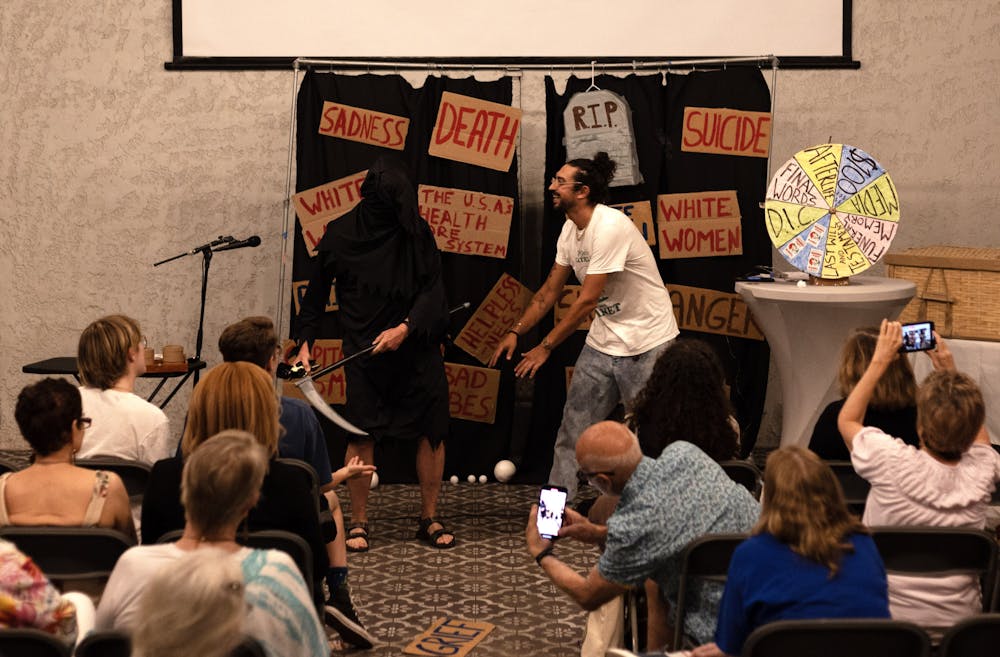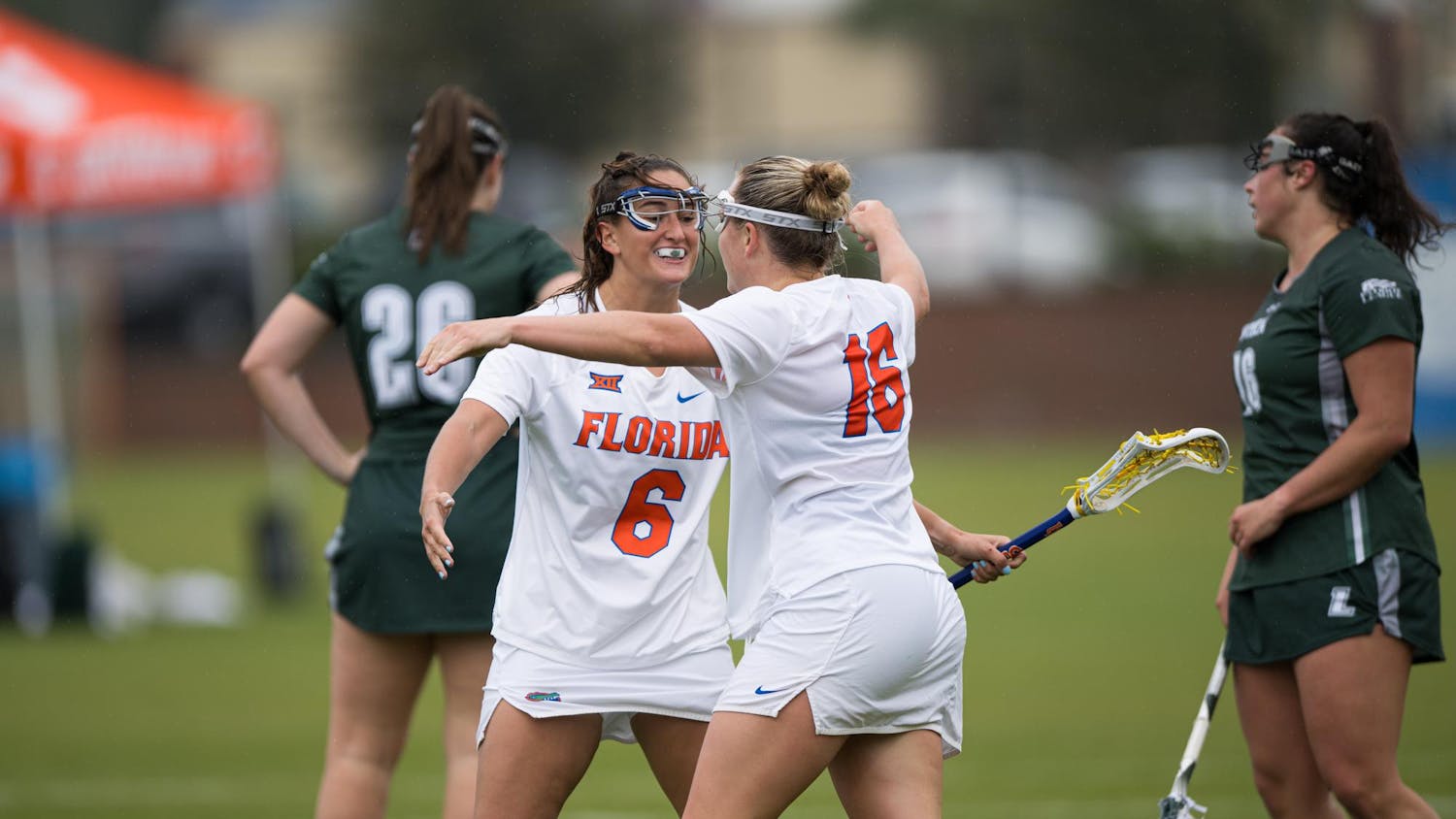Death is tragic and grief can be heartbreaking. For Ben Wasserman, a 35-year-old comedian, it can also be a little funny.
Wasserman is the creator and star of his “Live After Death” comedy show, a spectacle of dancing, spinning a “wheel of vulnerability” and Wasserman’s highlight: the crowd work.
“I honestly think my favorite part is in the vulnerable moments,” he said. “It is when I get to hear people’s stories, laugh with them about the people that they lost or their experience about grief.”
The crowd work was also a highlight for Victor Remley, a 19-year-old UF zoology sophomore who watched Wasserman’s Gainesville show.
“There was a lot of audience participation,” Remley said. “I liked, in the juggling, the banter that he had with the guy who was up there.”
Despite having performed his show more than 50 times over the course of two years, Wasserman can still remember some of the crowd interactions he’s had clearly.
“There’s a moment in the show where I perform a seance to try and get in touch with either one of my loved ones or someone’s in the room.” he said. “I opened the floor to see if anybody wanted to try and reach out to someone that they lost, and this dude in the back was like, ‘I’d like to talk to my dad.’”
After Wasserman got some information from the audience member on his dad and their relationship, he swept his arms grandly to perform the seance “magic” and announced to the room that the man’s dad was officially with them. He set the stage for the man to talk to his father and the whole room waited with bated breath.
“The guy just said ‘Dad, I’m gay,’” Wasserman said, “and then that was it.”
Those three words were enough to send the majority of the audience, including Wasserman, into tears. Those tears may not sound like a good sign for a typical comedy show, but the trek that Wasserman takes his audiences through grief and loss wouldn’t be complete without the full spectrum of human emotion.
“I am a comedian first and when I set out to do the show, I set out to put on like a really f*cking funny, entertaining show that no one has ever seen before,” Wasserman said. “I’d be lying if I didn’t say it feels really nice when people come up to me after the show and just ask for a hug or cry with me or thank me for giving them the space to talk about their loved ones.”
Wasserman may be getting tearful hugs after his shows now, but the show’s first two performances in 2021 were met with shock.
“There was a lot of blood in the first two versions of the show,” Wasserman said.
He had a bowl of marshmallows sitting alongside him on stage, some of which had index cards with prompts for bits and memories in them, and some of which had razor blades.
“The whole gag was, ‘I’m afraid of dying, I’m afraid of death, I don’t want to die, but I have to confront that fear,’” Wasserman said.
Confronting that fear meant that he did, at times, eat razor blades.
“I do a little bit of magic and so I know how to eat a razor blade without hurting myself,” Wasserman said. “But I also had a lot of fake blood coming out and people were, like, really turned off.”
From the beginning, Wasserman knew he needed a performance space as offbeat as his show and settled on a funeral home. He invited a funeral home owner to his first show to try and persuade her to let him bring his show to the space.
She was overwhelmingly excited about the prospect and agreed that the show would be a good fit for the funeral home. Her one condition: “none of that blood sh*t.”
Wasserman readily agreed, and the show began to happen at funeral homes across his native New York City. His Gainesville show is an exception, not occurring at a funeral home but benefiting one instead, the Natural Burial Society.
The Natural Burial Society, run by Jane Roy and William Heath, is a resource center for end-of-life operations. The group, supported in part by the fundraising efforts of Wasserman’s show, plan to open a funeral home in Gainesville offering a “holistic end of life approach.”
In addition to addressing issues in the deathcare industry, a major facet of the Natural Burial Society’s work surrounds the affordability of death. William Heath, a 45-year-old licensed funeral director, outlined the cost-cutting changes that the Society plans to implement in its own funeral home.
“Natural burial doesn’t include a vault,” he said. “The casket is biodegradable and accordingly, a much less expensive object. It makes the burial more affordable, significantly more affordable.”
After hearing about the work Roy and Heath are doing, Wasserman jumped at the chance to partner with them for this show. Their atypical approach to death mirrored his show, a performance that values tears and reflection almost as much as it does laughter.
“The material itself, when I first started coming up with it and performing it, was incredibly cathartic for me,” Wasserman said. “The material was really just like a cathartic kind of pressure valve being released and letting stuff out.”
As he has let his emotions out and come to terms with his grief, Wasserman has seen that the show is just as much for his audience as it is for him.
“It has been a really powerful experience being able to hear people’s stories and connect with them, both me feeling less alone and them feeling less alone,” he said.
Contact Bea Lunardini at blunardi@alligator.org. Follow her on Twitter @bealunardini






